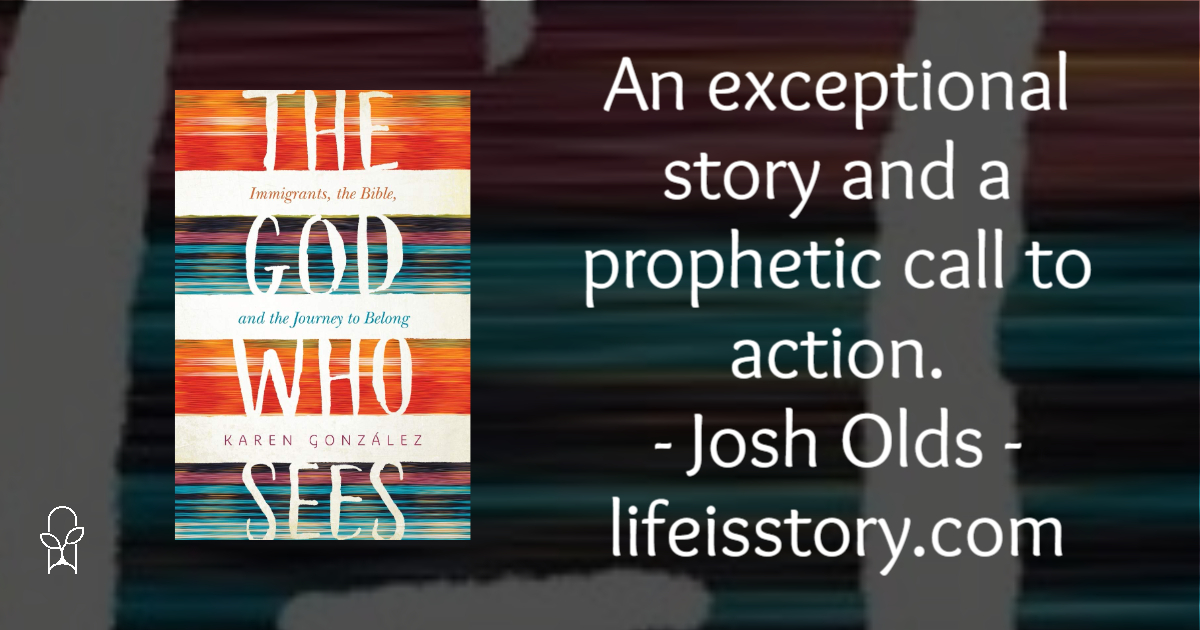
Also by this author: Beyond Welcome
Published by Herald Press on May 21, 2019
Genres: Non-Fiction, Christian Life, Memoir, Racial Reconciliation
Buy on Amazon
Goodreads

Meet people who have fled their homelands.Hagar. Joseph. Ruth. Jesus.
Here is a riveting story of seeking safety in another land. Here is a gripping journey of loss, alienation, and belonging. In The God Who Sees, immigration advocate Karen Gonzalez recounts her family’s migration from the instability of Guatemala to making a new life in Los Angeles and the suburbs of south Florida. In the midst of language barriers, cultural misunderstandings, and the tremendous pressure to assimilate, Gonzalez encounters Christ through a campus ministry program and begins to follow him.
Here, too, is the sweeping epic of immigrants and refugees in Scripture. Abraham, Hagar, Joseph, Ruth: these intrepid heroes of the faith cross borders and seek refuge. As witnesses to God’s liberating power, they name the God they see at work, and they become grafted onto God’s family tree.
Find resources for welcoming immigrants in your community and speaking out about an outdated immigration system. Find the power of Jesus, a refugee Savior who calls us to become citizens in a country not of this world.
A few months ago, I came across a 1980 debate between then-Presidential candidates Ronald Reagan and George H.W. Bush. I was floored with how both Republican candidates spoke about the need for open borders to solve mutual problems, how illegal immigration was a symptom of a larger problem and not a problem itself, how walls did not need to be built. It’s a complete change from their party forty years later. While both of those individuals had many, many flaws, I felt like they truly saw immigrants as humans in need and wanted a solution that would lead to mutual flourishing.
The God Who Sees: Immigrants, the Bible, and the Journey to Belong is part-memoir, part-biblical reflection, part-immigration policy reform. Karen Gonzalez uses her personal immigration story, her current work with World Relief, and her Christian faith to weave a story that illustrates the life of immigrants today against the backdrop of Scripture—developing a simple theology of immigration that could be boiled down into “Love your neighbor.”
Gonzalez alternates chapters between her story and the biblical narrative. It’s a little two-step dance that engages readers thoroughly and helps bridge the connections between the modern immigrant experience and these stories from Scripture. The five characters she focuses upon are Naomi/Ruth, Abraham, Hagar, Joseph, the unnamed Syrophoenician Woman, and then concludes with Jesus and his family. Gonzalez does not write as a biblical scholar but her observations are astute and well-researched. Especially poignant, I thought, was how she brought out that Boaz’s generosity in the Ruth/Naomi narrative isn’t something done out of simple goodwill. Rather, Boaz is legally mandated by God’s law to such generosity and care for the foreigner.
The God Who Sees takes its title from Hagar’s narrative. Hagar, whose name means “foreign thing,” who is a slave, who is abused, and who not only saw God but learned that God saw them. She is the first person to name God in Scripture and she calls God “The God Who Sees.” It’s a name that is both comfort and warning. God sees the plight of the immigrant, and is moved by love and justice. Will we stand with God, see through God’s eyes, and learn the perspective of the immigrant?
Gonzalez shares her own story with a humble vulnerability, writing about her own immigration a child from Guatemala, where the Reagan administration had funded warfare and violence (see the part about many, many flaws above), and how she struggled to find identity and belonging in a new culture. There’s nothing exceptional about Gonzalez’s story, but therein lies its power. Life is story and Gonzalez’s story is full of meaning and depth and tragedy and beauty. It is a story of continually overcoming and the mere fact it is not exceptional should be a shame.
The God Who Sees calls us to do better. The final sentence in the book asks a powerful question: “Will we live out the radical and subversive hospitality that Jesus modeled for us?” In an appendix, the book gives practical examples for action and reflection, moving readers from a state of knowing to a state of doing. These are not just facts or stories to know, they must be the impetus for change—both to ourselves internally and our society externally. There are also discussion questions for each chapter that would make this book a powerful small group study. The God Who Sees is an exceptional story, a prophetic call to action that we must heed.
